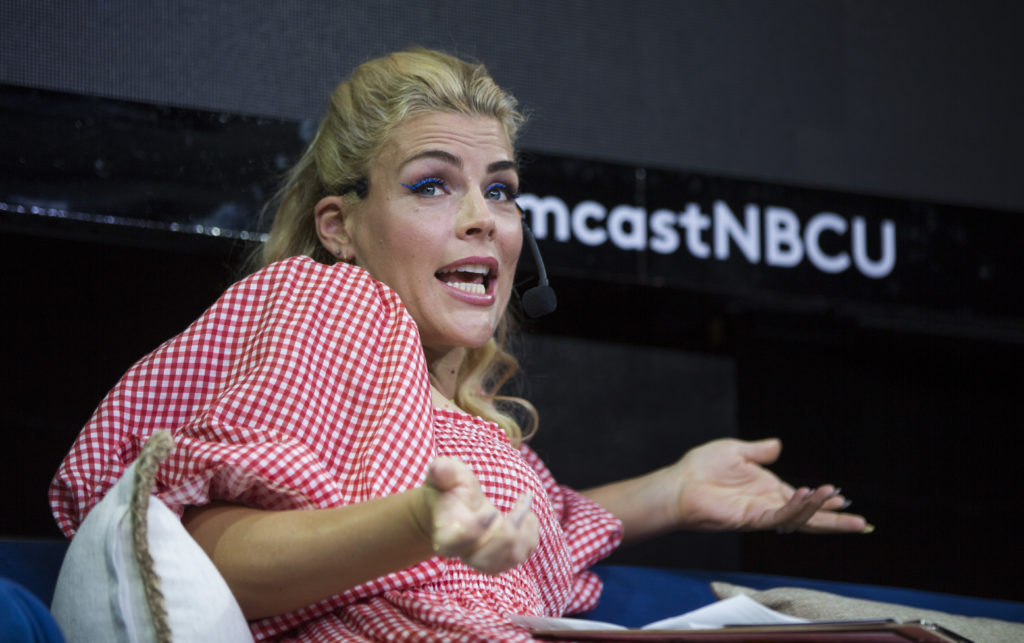The dominant message of female comedians at South By Southwest was one of resounding independence, determination and inclusivity.
By Courtney Runn, Photo by Erich Schlegel with AP Images for Comcast NBCUniversal.

There are not enough diverse roles in comedy, TV or film, so women are creating their own roles. From Busy Philipps dreaming up her own late-night talk show to Aidy Bryant playing a character on Shrill she never saw growing up, the dominant message of female comedians at South By Southwest was one of resounding independence, determination and inclusivity.
The festival featured a star-studded lineup of female comedians this year, including Mindy Kaling, Philipps, Bryant, Elizabeth Banks, Amber Ruffin, Jenny Hagel, Ilana Glazer and Abbi Jacobson, not to mention the countless other women represented in the comedy track.
Harassment and exclusion played central roles in most of these women’s current success stories. Philipps remembers Dawson’s Creek as a stressful, demoralizing experience, as the team focused more on her body than her acting.
“I needed to change who I was to fit the mold,” she said during her keynote talk.
She started to ask, “Why not me?” but in the 1990s and early 2000s, there weren’t many platforms for women to create their own content and shows. Social media, YouTube and streaming platforms wouldn’t begin to change the industry until the 2010s.
Banks who now co-owns her own production company and produced and directed Pitch Perfect 2, which is the highest-grossing musical comedy of all time, was often told she was too “uppity” and had too many ideas.
“I think I have 80 credits on IMBD, and I’ve been directed by two women,” she said during her interview with Bryant. “These male directors want you to be quiet and show up and flirt a little and say your lines and not have ideas.”
The Center for the Study of Women in Television & Film published a report that noted “only 35 percent of films featured 10 or more female characters in speaking roles” in 2018. Women had only 35 percent of overall speaking roles in films, a slight decline from 2017. There was a slight increase in black females in films but a decrease in Latina representation. Asian actresses had more roles, but mainly thanks to Crazy Rich Asians.
“I’m not quite sure I ever saw someone like myself on screen,” Bryant said during her interview.
She plays the leading role in Shrill, a Hulu show based on writer Lindy West’s memoir of the same name and produced by Banks. The body-positive show features a character named Annie, who feels defined by her weight until she begins to reclaim her self-image (and tells off the local fitness instructor who wants to help the “small person inside of her”).
Philipps created Busy Tonight after realizing there were no women in late-night television. NBC announced this week Lilly Singh will replace Carson Daly, making her “the only woman to host on the big-four networks.”
Actresses are beginning to star in the roles they never had growing up, but maybe more importantly, they are also using their power to hire.
In her fireside chat, Kaling said true confidence is stepping back to let other shine. And she’s doing just that.The Office and Mindy Project actress is producing a Hulu remake of Four Weddings and a Funeral. Instead of an all-white cast like the original, she hired a black actress and an Indian-British man alongside a white actress.
“I’m a leader and I need to use that opportunity by hiring people,” Kaling said.
This week showcased a group of women making significant strides in the industry, but similar to women-led improvements in various industries, there is no quick fix.
“I don’t want us to be complacent,” Hagel says. “There’s a tendency to be like, ‘Oh, this is a great time to be a woman in comedy.’ I think what people want to hear is that it’s fixed. … It’s better than it was but there’s still a long way to go.”
With #MeToo exposing untoward actions of many male comedians, comedy itself is beginning to change as voices shunned give way to new perspectives.
“I think we’re entering a time in comedy where people are stopping to think about what they’re actually saying,” Bryant said. “I’m excited to see people approaching comedy from a thoughtful place.”
As Netflix, Hulu, Instagram and other digital platforms provide space in a noisy industry, more voices and perspectives will continue to emerge. While it might be slow going, there is finally a place for women like Philipps who had a voice but no microphone.
“I’m here for the revolution that is women making more content,” Banks said. “I didn’t start it but I’m a big champion of it.”

